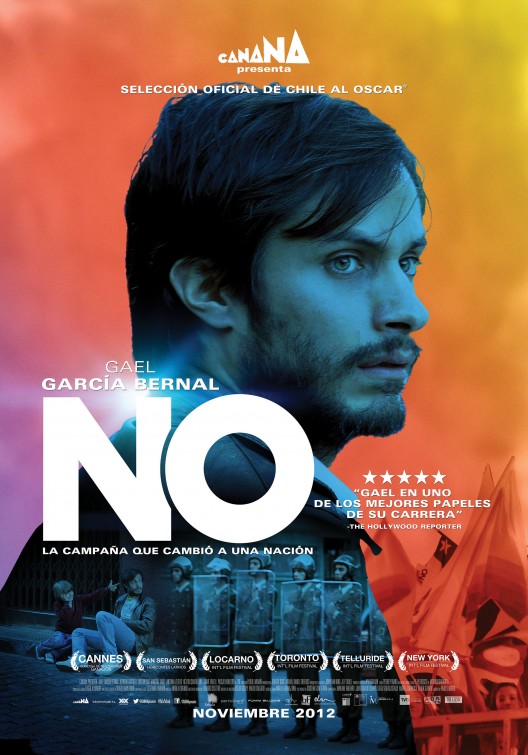Review of NO, Directed by Pablo Larraín
By KENDRICK KUO
NO more dictatorship. NO more executions. NO more torture. NO more censorship.
NO is a Chilean film depicting a plebiscite that occurred in October 1988 to decide whether Gen. Augusto Pinochet Ugarte should stay in power for another term. During the 27-day campaign, daily 15-minute advertisements on national television were allocated for each side—the No and the Yes campaigns. NO follows the life of René Saavedra (played by Gael García Bernal of The Motorcycle Diaries fame). Saavedra is the son of a political exile who works at an advertising agency and is drafted to run the No campaign, while his conservative boss, Lucho Guzmán, runs the Yes campaign.
The first thing you notice about NO is the quality of the footage. Director Pablo Larraín used U-matic cameras, which were the types of cameras used on Chilean television during the 1980s and provide the grainy resolution and antique look. While this may put off some audiences, this allows the movie to meld seamlessly into the archive footage of the political campaign commercials, police activity, and speeches by Pinochet. The U-matic touch makes NO come alive by convincing viewers to historically dislocate themselves and see René as actually living in the story’s context. René becomes an advertising executive living his advertisements, not just making them.
A second directorial decision, which I applaud, was the use of long segments dedicated to actually rerunning the campaign ads for today’s viewers. As someone who has little background in Latin America, I found them enlightening. I was glad that the narrative of making the campaign ads did not obscure the ads themselves. In many ways, the fictionalized narrative acted as a buttress to these ad segments, framing them for us to have a deeper comprehension of what they meant to Chileans in the 1980s.
I attended the press screening with a Chilean friend whose mother was a former communist and actively gave speeches during the No campaign. The jingle accompanying the No campaign ads, “Chile, happiness is coming” was a familiar one him and he sang along during the screening. He remembers the night when the votes were counted and Pinochet was unseated. To him, NO was a political film that affirmed the hard-won gains in Chile that would allow such a film to be made today in his country.
NO is a combination of Mad Men and Wag the Dog placed in Chile within a historical era of fascism versus socialism. The conflict, however, is not just between the center-left No campaign and the Yes campaign. There is an element of intra-No conflict, where one wing wants to highlight the regime’s crimes of the past and air their grievances publicly, while another wing casts a vision for a better Chilean future that offers hope rather than an inability to move beyond the past. René is of the latter persuasion and his ideas carry the day.
It seems that the expectation—the hope of a better future—oftentimes becomes the monopoly of authoritarian regimes, leaving the opposition relegated to negative messaging. Think of the Soviet-era posters of happy workers around the world uniting, the Maoist images of fat and prosperous farmers, or of triumphant imagery of the Third Reich. The Yes campaign was built on the idea of a “winning” country led by Pinochet. I am no historian or political scientist, but maybe that is what made the No campaign so compelling. Authoritarian regimes so thoroughly saturate the political space that dissent is defined by what it’s against, not what it is for. The No campaign said no to authoritarianism, yes to democracy; no to censorship, yes to freedom; no to torture, yes to justice.
Now that the No campaign won and Chileans live in a democratic society, are all the promises fulfilled? Is Chile actually happy? Has happiness come? To a degree, yes—at least more so than under the Pinochet regime. But political promises are asymptotic, always left unfulfilled to a degree.
So how should we as Christians understand NO? Should we align Christianity with the cause of democratization, citing similar values? Unarguably, treating people with dignity due to their creation in God’s image is part of the foundation of democracy. Yet democracy is not our ultimate goal, not even in the political sphere. What do we say to the Chinese Christian living in modern communist China or the Saudi Christian living on the Arabian Peninsula? I think we should say that the politics of this world is also in need of redemption and that perfect politics will only occur when the perfect polity has arrived—in the city whose builder and maker is God (Heb. 11:10). And this redeemed politics is not something any earthly party can deliver.
Utopianism and its softer variants are misled. We are in desperate need of a new reign, a political system that has not been seen on earth since the Garden, nor will be seen again until the trumpet sounds.












